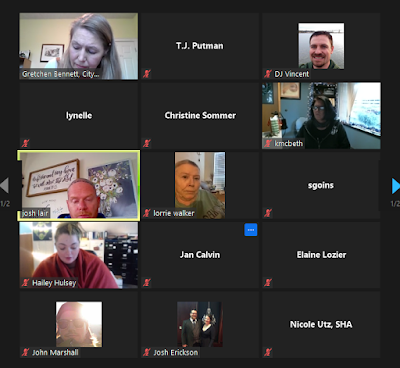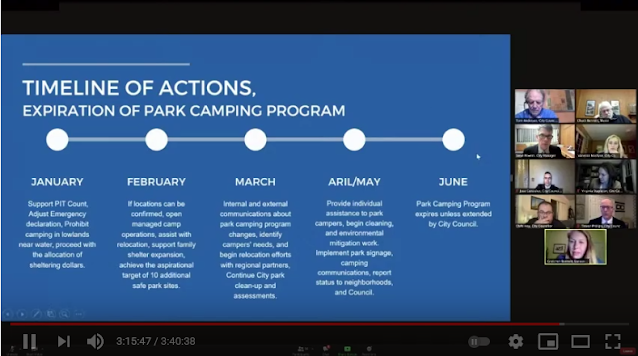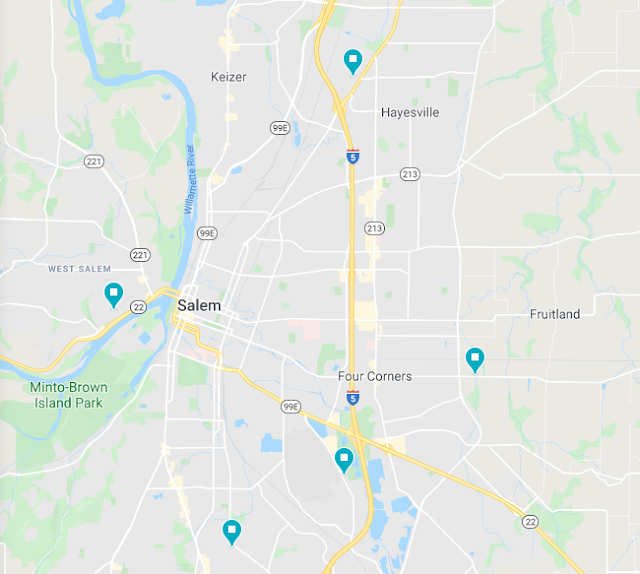By Sarah Owens and Michael Livingston
Councilor Nordyke sure thinks so. Monday night, she praised City Council and staff for "helping move the needle on a crisis that has been decades in the making" by prohibiting loitering and public gatherings of three or more, opening Cascades-Gateway and Wallace Marine Parks to overnight camping, and passing a sit-lie ordinance. See "
COVID-19 Returns Campers to City Parks."
"If you look at our downtown streets, you can clearly see the results", Nordyke told Council. "You can tell by how clean the streets are." (Find a transcript of her complete statement at the end of this post.)
Nordyke's comments were made during the opening segment of Monday night's meeting of the City Council, the first meeting since sit-lie was enacted (March 23), just as the City was going in to "lockdown" under a statewide order to "
Stay Home, Save Lives." Monday night's meeting was the first to occur in novel corona virus format: the video conference.
We asked Jimmy Jones, Executive Director of the Mid-Willamette Valley Community Action Agency, if he thought sit-lie had cleaned up the downtown streets, or that "the needle" had been moved, as a result of the City's recent actions.
Jones told us by email that "[s]it-lie had nothing to do with cleaning up the downtown" because it isn't being enforced and that "giving people a place to go cleaned up the downtown streets."
By "place to go", Jones was referring to the parks, because the pandemic shrunk all available shelter spaces and torpedoed the City's plan for a tent day shelter in Marion Square Park. "We asked the city to open the parks for camping because of public health concerns centered on COVID", he said, explaining that, up until summer of last year, authorities had tolerated camping in Wallace Marine and Cascades-Gateway Parks.
So what about the idea that clean streets show that the City's "moved the needle"? There might be fewer complaints from downtown businesses, Jones responded, "but nothing fundamental has changed."
The City has, however, received dozens of
new complaints from SEMCA and residents of Paradise Island Park, a 55+ manufactured housing park with 214 homes located on the southern end of Cascades-Gateway Park. See their written comments
here, summarized in a letter from Cory Poole, SEMCA's Chair and the park's owner-operator:
The letter urges Council to make five changes to "the current camping policy", including the immediate establishment of a "post-pandemic homeless camping policy."
Monday night, Council briefly discussed the situation in the parks before voting unanimously to
extend the City's emergency declaration. See
here at ~1:20:00. As usual, the discussion focused on the City's response to complaints.
Hitherto, City Manager Steve Powers typically would call on Kristin Retherford, Director of the Urban Development Department, to give Council a status report on the City's response. But ever since the state of emergency went into effect, the City's homeless point person has been Gretchen Bennett. Bennett works in the Mayor/City Manager's Office and is not related to the Mayor.
Before Bennett gave her report, Powers told Council that Bennett, Parks and Transportation Services Manager Mark Becktel and Police Chief Moore made regular inspections of Cascades-Gateway and surrounds. They had arranged to tour Cascades-Gateway Park with Poole on Wednesday, and Mayor Bennett asked to go along, as did SEMCA's three councilors (Andersen, Nanke and Leung).
As part of her new responsibilities, Bennett has been writing formulaic, empathetic-sounding emails to individual complainants. Councilor Lewis praised Bennett for her "personal touch." Example:
Councilor Lewis told Council that the situation in Wallace-Marine Park "necessitated bringing the police army vehicle over to Roth's West Salem parking lot last week." Mayor Bennett said he wanted to send the "command vehicle over to Cascades-Gateway and give it a couple of days as well." There were no questions about this "command unit" strategy, and it was not discussed further.
Councilor Hoy said he wanted "to remind folks that homelessness is an issue throughout the City", that the population had recently "exploded", with "people camping on the sidewalks on Market, on Lancaster, all over the place." He exhorted Council to "be more assertive" and to "keep reminding our friends at the State that they created a lot of this problem through the de-institutionalization of folks without proper community support." Councilor Kaser agreed with Hoy and said "We should be sending a letter a week", and "we should be bugging the dickens out of the state legislature to actually do something."
There the discussion ended. If the City is working on a plan for the coming winter, they've given no indication of it. In all likelihood, pandemic-related social distancing requirements are going to limit the availability of shelter space, including emergency warming, and the hoped for low-barrier shelter funding is nowhere in sight. The City needs to prepare, now, to deal with this reality or people will die.
As for the park camping, Jones predicts that "[t]he same thing will happen here as has happened before, both in Salem and every other small town in Oregon."
A critical mass will be reached and the Council will react by evicting them from the park[s]. At that point, they will disperse again throughout the neighborhoods and in the downtown. New complaints will emerge. City government will consider how this could have happened again, and new plans will be crafted to deal with the same conditions again. Lather. Rinse. Repeat.
And
not just in Oregon ------->
Jones says "command unit" strategies, like the camping, loitering, gathering, sitting and lying bans, don't work because they don't house anyone.
"There is one undeniable fact here", Jones told us by email. "No criminalization approach stands any chance of succeeding. The Council can rule as they like and the Police can enforce as they may, but that will not reduce homelessness so much as one person in this city."
Such approaches also don't make people leave town, Jones told us.
"We can gravitate toward a law-and-order approach
as they have in Grants Pass, but it will not drive anyone out of Salem to Eugene or Portland. Eventually someone is going to have to realize that these are American citizens and they are in need. Our proper response is to serve and house them, not scapegoat them for their poverty."
About the impact of the camping on the parks, Jones feels the "concern over the environmental impact of poverty" is "telling."
"When people are cold, they make fires. When people are hungry, they cook food. When they are wet, they build shelter. All of these things have an impact on the lived environment the same way as our cars, factories, and landfills do for housed people."
Salem Reporter is running a series on the May election. As ever, homelessness is the top issue in Ward 1. See Harrell, S. "I
n downtown Salem ward, council candidates cite homelessness as defining issue." (30 April 2020,
Salem Reporter.) Jan Kaluweit says he "envision[s] the city’s role as that of a strategic partner and collaborator coordinating and streamlining services between government, nonprofits and the business community." Virginia Stapleton believes "Councilor Kaser has been a terrific councilor in Ward 1" and that, "[a]s we care for those less fortunate than us we create a culture as a just and caring community and this will have a positive effect on all our residents." Kaluweit can be held accountable for progress toward his vision. It will be much more difficult to hold Stapelton to account for hers.
& & &
Councilor Nordyke's comment Monday night:
I want to say that it's been a little over a month since we declared a citywide state of emergency [March 17, 2020] and about a month since we passed the sit-lie ordinance [March 23, 2020]. If you look at our downtown streets, you can clearly see the results of passing the ordinance and you can clearly see the results of having passed our citywide state of emergency. I still firmly believe that our sit-lie ordinance strikes a balance between the needs of our unsheltered and the needs of our business community. And you can tell by how clean the streets are that you can tell that difference. We have a number of folks who are in shelter or in camping areas because we've been working diligently with our community partners, with business owners, talking to all kinds of stakeholders. Do I feel like we have the problem solved? No, but this is a step in the right direction and I want to commend my colleagues and our city staff for helping move the needle on a crisis that has been decades in the making so I thank my colleagues for their support of these programs. I look forward to addressing our next steps in addressing homelessness in our city.
Jimmy Jones' email reply to our question:
Sit-Lie had nothing to do with cleaning up the downtown. It isn’t even in effect yet. We asked the city to open the parks for camping because of public health concerns centered on Covid, as they had unofficially been for years until the Summer of 2019. Giving people a place to go cleaned up the downtown streets. If at some point in the future they reverse course and close the parks we will have the same outcome (people living on the streets in the downtown, whether sit-lie is in effect or not). The needle may have been moved for some interests, but nothing fundamental has changed. This nearly year long debacle wasn’t caused by our homeless. It was caused by poor policy decisions. If Salem doesn’t learn from its mistakes they will repeat them again and our homeless community will again suffer for it. The best course of action is to leave them be and for government to practice enough patience to give our evidence based efforts the time to work.
5/3/20 Update: The City Manager's "Update" for 4/28 states:
Staff continues to work on being ready for state funding for a navigation center to serve homeless individuals. The state funding is expected to be considered when the legislature holds an emergency session. If the funding is provided to the City, there will be an urgent need to begin implementation of the shelter and coordination of services in one location. Staff will have updates and recommendations for council consideration this summer (timing will be guided by when the legislature meets) for an interim (90 day) and a permanent location for a navigation center.


















